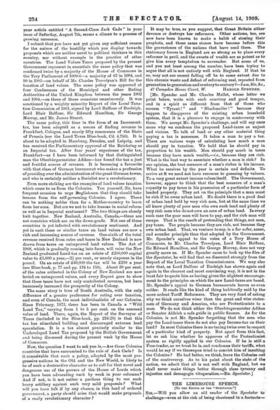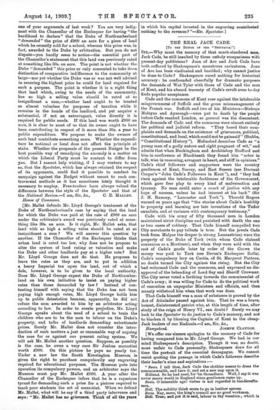THE LIMEHOUSE SPEECH.
[To 1112 EDITOR OF ills "SpEorrroal SIR,—Will you allow an old reader of the Spectator to challenge—even at the risk of being chastened in a footnote–, one of your arguments of last week ? You are very indig- nant with the Chancellor of the Exchequer for having "the hardihood to declare" that the Duke of Northumberland "demanded" the price of 2900 an acre for a piece of land which he recently sold for a school, whereas this price was, in fact, awarded to the Duke by arbitration. But you do not dispute—you hardly seem to notice—the essential part of the Chancellor's statement that this land was previously rated at something like 30s. an acre. The point is not whether the Duke ." demanded " this price or only consented to take it—a distinction of comparative indifference to the community at large—nor yet whether the Duke was or was not well advised in securing the highest price he could for land required for such a purpose. The point is whether it is a right thing that land which, owing to the needs of the community, has so high a selling value should be rated at so insignificant a sum,—whether land ought to be treated as almost valueless for purposes of taxation while it remains in the hands of the landlord, and yet acquire a substantial, if not an extravagant, value directly it is required for public needs. If this land was worth 2900 an acre, it is clear to most of us that its owner ought to have been contributing in respect of it more than 30s. a year to public expenditure. We propose to make the owners of such land contribute something more. Whether the expendi- ture be national or local does not affect the principle at stake. Whether the proposals of the present Budget be the best possible way of remedying the anomaly is a matter on which the Liberal Party must be content to differ from you. But I cannot help wishing, if I may venture to say so, that the Spectator, which has always retained the respect of its opponents, could find it possible to conduct its campaign against the Budget without resort to such con- troversial methods as it has sometimes lately thought it necessary to employ. Free-traders have always valued the difference between the style of the Spectator and that of the National Review.—I am, Sir, &c., C. E. MALLET. House of Commons.
[Mr. Mallet defends Mr. Lloyd George's treatment of the Duke of Northumberland's case by saying that the land for which the Duke was paid at the rate of 2900 an acre under the arbitrator's award was previously rated at some- thing like 30s. an acre. Is it right, Mr. Mallet asks, that land with so high a selling value should be rated at so insignificant a sum ? We will answer this question by another. If the Chancellor of the Exchequer thinks that urban land is rated too low, why does not he propose to alter the system of land rating or valuation and make the Duke and other landlords pay at a higher rate? But Mr. Lloyd George does not do that. He proposes to leave the rates as they are, and to put in addition a heavy Imperial tax upon the land, out of which a dole, however, is to be given to the local authority. Does Mr. Lloyd George expect the Duke of Northumber- land on his own initiative to insist on paying higher rates than those demanded by law ? Instead of con- tenting himself with saying that the Duke has not been paying high enough rates, Mr. Lloyd George holds him up to public detestation because, apparently, he did not refuse the sum awarded to him by an arbitrator acting according to law. In order to create prejudice, Mr. Lloyd George speaks about the need of a school to train the children who are to be the men to labour on the Duke's property, and talks of landlords demanding extortionate prices. Surely Mr. Mallet does not consider the intro- duction of such matters a just or reasonable way of arguing the case for or against our present rating system. We will ask Mr. Mallet another question. Suppose, as possibly is the case, he owns a very rare Sir Joshua mezzotint worth 2900. On this picture he pays no yearly tax. Under a new law the South Kensington Museum is given the right to purchase compulsorily any engraving required for educational purposes. The Museum puts into operation its compulsory powers, and an arbitrator says the Museum must pay Mr. Mallet 2900. A. year after the Chancellor of the Exchequer infers that he is a rapacious tyrant for demanding such a price for a picture required to teach poor students the art of mezzotint. When we defend Mr. Mallet, what will he say if a third party intervenes and Says: "Mr. Mallet has no grievance. Think of all the years in which his capital invested in the engraving contributed nothing to the revenue ? "—En. Spectator.'







































 Previous page
Previous page